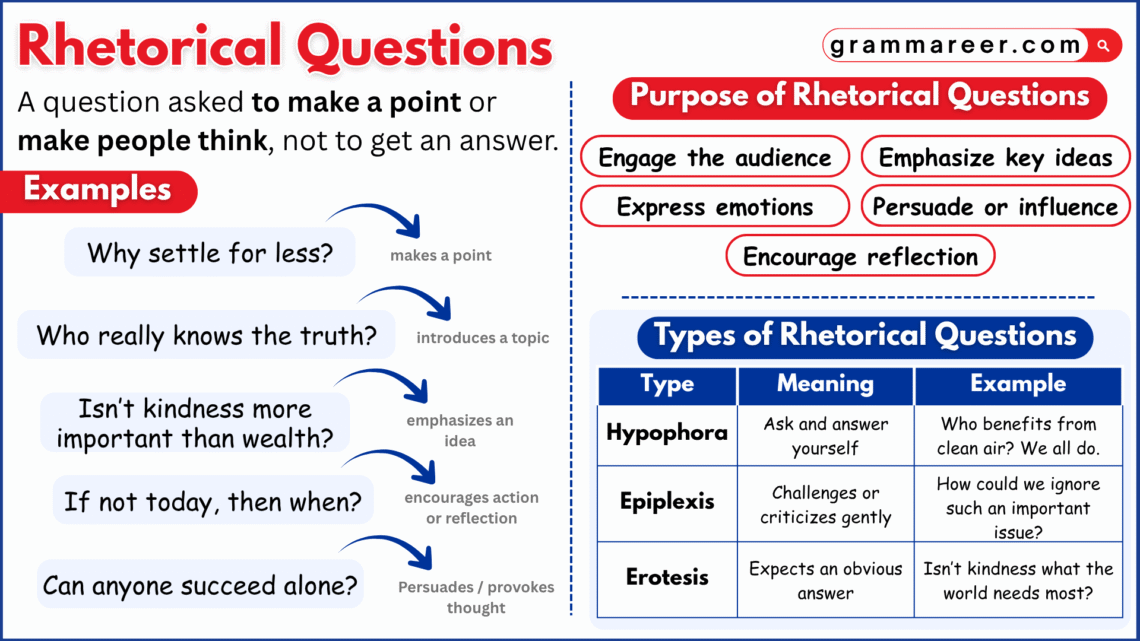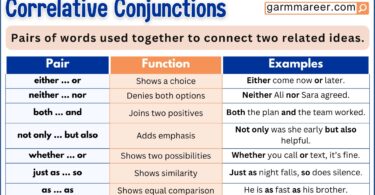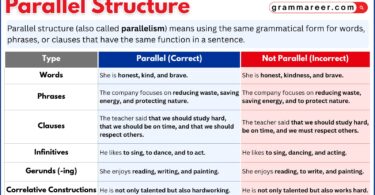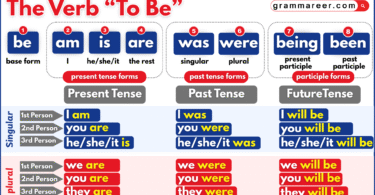A rhetorical question is a question we ask to make a point, not to get an answer. It’s a clever way to capture attention or stress an idea. We come across rhetorical questions all the time — in speeches, ads, books, and even our daily conversations.
Writers and speakers use rhetorical questions to make their message stronger and more engaging. These questions encourage us to pause, reflect, and connect emotionally with the words being shared.
In this article, we’ll learnwhat rhetorical questions are, why we use them, and how adding them to our writing or speaking can make our words more powerful and memorable.
Table of Contents
What is a rhetorical question?
A rhetorical question is a question we ask to make a point, not to get an answer. It’s a smart way to express feelings or highlight an idea.
We often use rhetorical questions to make people think, add emotion, or make our message sound stronger. For example, when someone asks, “Do I look like I care?” they’re not really expecting an answer — the meaning is already clear.
Rhetorical questions help guide the listener’s thoughts and make communication more engaging. They turn simple sentences into something more powerful and thought-provoking.
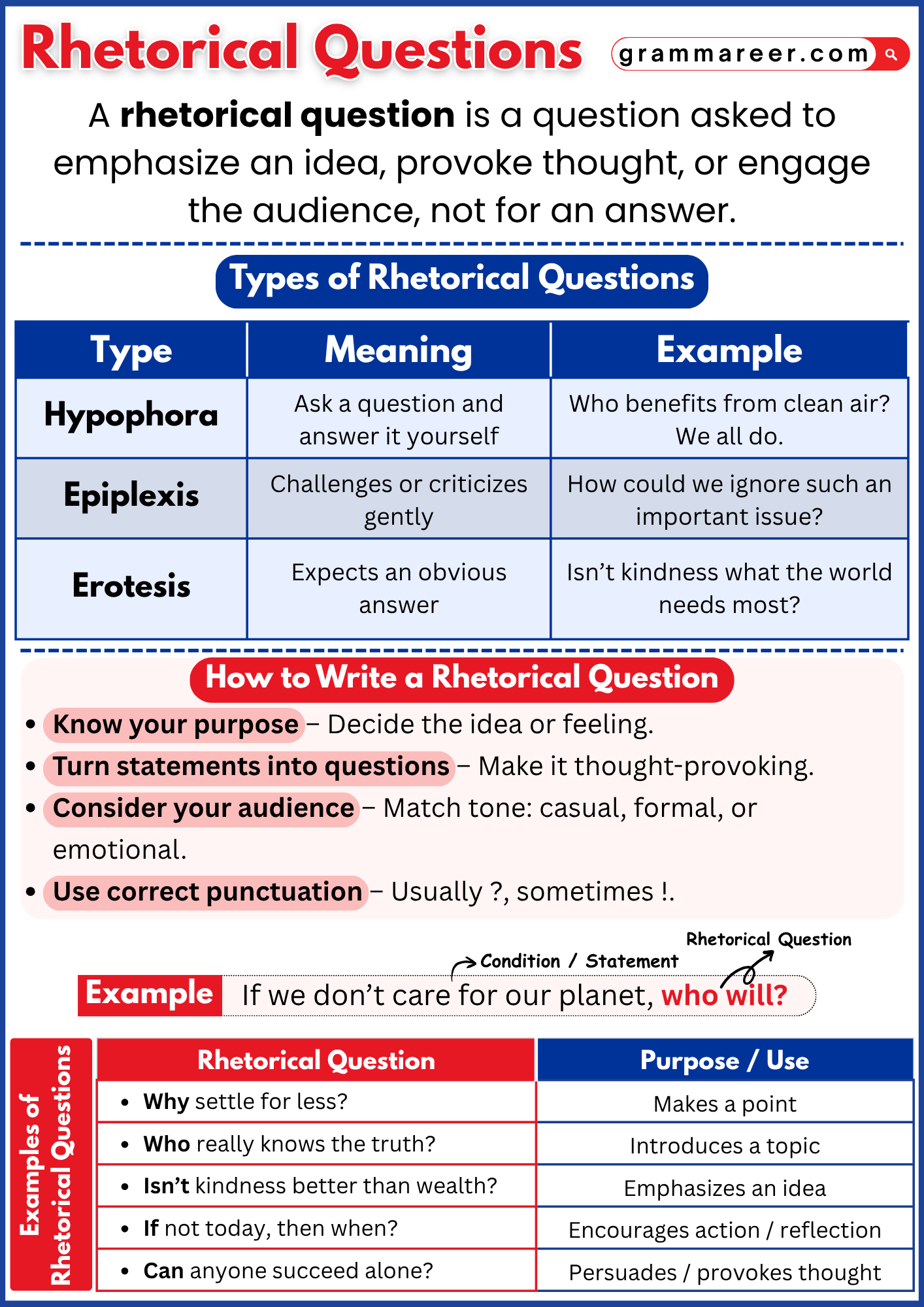
Types of Rhetorical Questions
Rhetorical questions come in many forms. Each type has a different purpose — some make us think, some challenge us, and others bring out emotions. Let’s look at a few common types and how we can use them.
| Type | What It Means | Example | How We Can Use It |
|---|---|---|---|
| Hypophora | This is when we ask a question and then answer it ourselves. It helps guide people toward a clear idea. | • Who benefits from clean air? We all do. | Use it to introduce a topic or explain your point clearly in writing or speeches. |
| Epiplexis | This kind of question challenges or criticizes in a gentle way. It’s meant to make people think or feel responsible. | • How could we ignore such an important issue? | Use it when you want to inspire action or create emotional impact. |
| Erotesis | This question expects an obvious answer. It’s used to make a strong statement rather than to seek information. | • Isn’t kindness what the world needs most? | Use it to emphasize your message or strengthen your argument. |
Purpose of Rhetorical Questions
We use rhetorical questions when we want to persuade, highlight an idea, or connect with others emotionally. They make our message more powerful and help the listener or reader think deeply about what we’re saying.
Throughout history, great speakers and writers have used rhetorical questions to inspire change, motivate people, and make ideas memorable. But they’re not just for famous speeches — we use them in everyday life too!
Here’s where rhetorical questions often come in handy:
- In writing: To lead readers toward a point before giving facts or evidence.
- In speeches: To grab attention and make key ideas stand out.
- In business or teamwork: To encourage discussion or highlight a challenge.
- In daily talk: To show emotion, stress a point, or get someone thinking.
When used with the right tone, rhetorical questions can make our message more meaningful and engaging.
| Purpose | How We Can Use It | Example |
|---|---|---|
| To Persuade | Ask a question that leads people to agree with your point of view. | • Isn’t it time we made a change? • Who doesn’t want a better future? • Can we really succeed without teamwork? |
| To Emphasize an Idea | Turn an important thought into a question to make it stand out. | • What’s more powerful than knowledge? • Isn’t honesty the best policy? • How important is kindness in today’s world? |
| To Stir Emotions | Ask questions that touch people’s feelings or sense of responsibility. | • How could we ignore those in need? • Don’t we all deserve a second chance? • What if this happened to someone we love? |
| To Encourage Reflection | Use questions that make others stop and think in a new way. | • Are we truly living up to our potential? • When was the last time we stopped to appreciate what we have? • Have we done enough to protect our planet? |
Rhetorical questions don’t just fill space — they invite people to think, feel, and connect with what we say.
How to Write a Rhetorical Question?
Writing a rhetorical question isn’t about getting an answer — it’s about making your point stand out. Here’s how we can create one that really works:
1. Know your purpose:
Think about what message you want to send or what feeling you want to create. Do you want people to agree, reflect, or feel something strongly?
Example:
- To stress the need for action, you could ask, “If not now, then when?”
2. Turn a statement into a question:
Start with a clear thought, then flip it into a question that makes people think.
For example,
| Incorrect ❌ | Correct ✅ |
| instead of saying, “We should care more about the environment,” | ask, “If we don’t care for our planet, who will?” |
3. Keep your audience in mind
Make sure your question fits the people you’re talking to. A playful or sarcastic tone might work in casual talk but not in formal writing. Choose words your audience can relate to.
4. Use the right punctuation
Most rhetorical questions end with a question mark, but if you want to show strong emotion or surprise, an exclamation mark can work too.
Example:
- “How could anyone forget this moment!”
Rhetorical questions are simple but powerful — they make our words sound more thoughtful, emotional, and engaging.
Synonyms of Rhetorical Question
There isn’t a perfect synonym for a rhetorical question, but a few words come close in meaning. These terms describe questions that guide or suggest an idea rather than seek an answer.
Some related words include:
- Leading question – a question that hints at a specific answer.
- Persuasive question – a question used to influence or convince.
- Implied question – a question that suggests the answer without saying it directly.
- Figurative question – a question used for effect, not for a real response.
Each of these is slightly different, but they all share the same goal — to make the listener think, not reply.
Rhetorical Question Examples
- Isn’t honesty the best policy?
- Who doesn’t love a little kindness?
- Can we really achieve success without teamwork?
- What’s more powerful than knowledge?
- How could we ignore those in need?
- Don’t we all deserve a second chance?
- Are we truly living up to our potential?
- Isn’t this weather just perfect?
- Have we done enough to protect our planet?
- Do I look like I’m joking?
- Who wouldn’t want a better future?
- If not now, then when?
- What if this happened to someone we love?
- Isn’t change the first step toward growth?
- How could anyone forget this moment?
FAQs about Rhetorical Question
A rhetorical question is a question we ask to make a point, not to get an answer. It’s meant to make people think or feel something rather than respond.
For example: “Who doesn’t want to be happy?” — the answer is obvious, so it doesn’t need a reply.
The main purpose of a rhetorical question is to grab attention, emphasize an idea, or persuade the audience.
We often use them to:
• Highlight an important message
• Encourage reflection or emotion
• Make communication more engaging
Example: “If not now, then when?” — it pushes the listener to think and act.
Here are a few simple and natural examples:
• Isn’t honesty the best policy?
• Have we done enough to protect our planet?
• Do I look like I’m joking?
These questions don’t need answers — they’re meant to make us reflect and connect with the message.
You May Also Like

